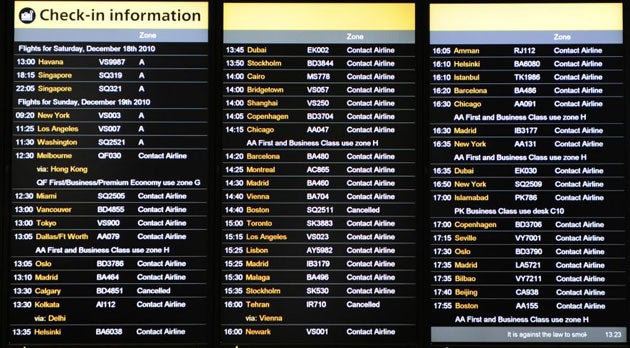Simon Calder: Mass cancelling of flights was the right thing to do
At this time of year it's not the money travellers care about. It's the emotional investmentthey have made

Your support helps us to tell the story
From reproductive rights to climate change to Big Tech, The Independent is on the ground when the story is developing. Whether it's investigating the financials of Elon Musk's pro-Trump PAC or producing our latest documentary, 'The A Word', which shines a light on the American women fighting for reproductive rights, we know how important it is to parse out the facts from the messaging.
At such a critical moment in US history, we need reporters on the ground. Your donation allows us to keep sending journalists to speak to both sides of the story.
The Independent is trusted by Americans across the entire political spectrum. And unlike many other quality news outlets, we choose not to lock Americans out of our reporting and analysis with paywalls. We believe quality journalism should be available to everyone, paid for by those who can afford it.
Your support makes all the difference.When the tiny airport on the Hebridean island of Benbecula handles roughly the same number of flights as Heathrow, the traveller senses trouble. By early afternoon yesterday I counted it a score draw at 4-4, with the Scottish airport edging ahead on points since it managed to accept arriving flights as well as dispatching departing planes.
Benbecula airport serves an average of 36,000 passengers a year; Heathrow, on a weekend which was always going to be the busiest in the build-up to Christmas, should have been processing that many people every three hours. By midnight last night I reckon 500,000 people who had planned to fly to, from or through Heathrow and Gatwick were experiencing "the trouble and inconvenience to passengers caused by cancellation of flights", as defined by EU regulation 261.
The rules may be clear, but they are hardly comforting: the quarter-million or so travellers whose flights from Heathrow or Gatwick over the weekend were cancelled are entitled to meals and accommodation until their airline can get them to their final destination. The rights of the equal and opposite quarter-million stranded at airports around the world are murkier; if they happen to be booked on an EU airline, or a caring carrier from outside Europe, the bills during their involuntary stay will be covered.
But at this time of year, it is not the money travellers care about; it is the immense emotional investment. That's why so many are so upset about the way this almighty muddle has been managed (or, if you prefer, mis-managed).
Everyone's interests in getting people where they needed to be were aligned at the weekend. Airports make proper money only when people are buying and eating, and stepping aboard planes. Every "airside" business within Heathrow, from cafés to duty-free shops, was empty. The last time this happened on a large scale, during the volcanic ash shutdown, staff from duty-free shops were sent to work on the ferries.
Airlines hate having to hand back cash – people who failed to fly to Sydney with BA or Virgin yesterday will have paid typically £1,500, and will want that money back. And if fewer people decide to fly over the festive spell, the airlines' future earnings could be severely affected.
Every cancellation generates grief. That is why many pilots pushed things as far as they could in a bid to beat the weather; captains and first officers were prepared to take a chance and wait for hours on the Tarmac, ultimately fruitlessly, because they understood just how much it matters to every passengers to get there. So the way that the UK's two biggest airlines, easyJet and BA, cancelled flights from Gatwick and Heathrow early and in bulk might look precipitous. But with hindsight, both decisions look shrewd in this messy business of maximising human happiness.
As many aggrieved passengers have pointed out, other airlines were operating at least some flights during these times. But the easyJet mass cull ensured the robustness of the operation when Gatwick returned to something like normal; otherwise dozens of aircraft would have been trapped at assorted Continental airports. And BA judged correctly that saving thousands of passengers the stress of a journey to Heathrow was a greater good than getting the odd Boeing to Boston or Beijing.
A discussion on how the Sellotape-and-string arrangement of airport capacity in south-east England exacerbated the crisis can wait for another day. For now, let us hope these distressed travellers get where their hearts say they should be. Including Benbecula.
Simon Calder is The Independent's Senior Travel Editor
Join our commenting forum
Join thought-provoking conversations, follow other Independent readers and see their replies
Comments